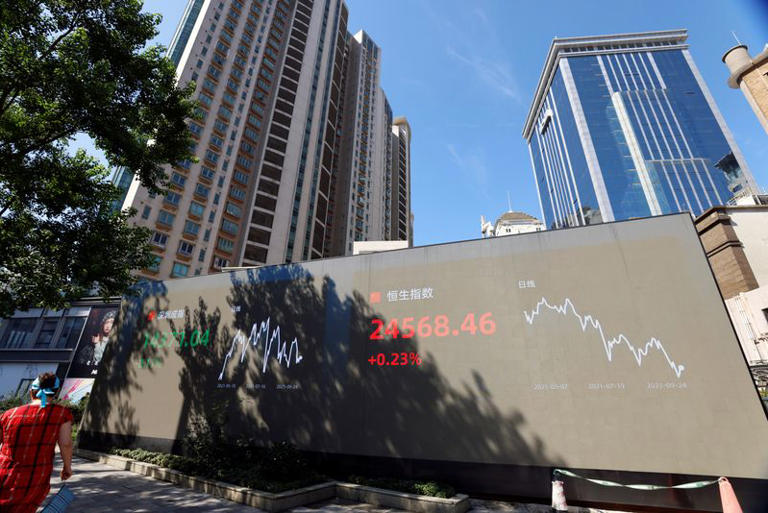On Friday, Chinese stocks experienced a significant decline, accompanied by a fall in the yuan, which subsequently impacted markets across Asia. This downturn followed an equity market rally triggered by a surprise rate cut in Switzerland, leaving traders vigilant as the yen edged back towards multi-decade lows and Japanese officials intensified efforts to address currency depreciation. The yuan weakened to a four-month low, breaching the psychologically important level of 7.2 per dollar, prompting major state-owned banks in China to sell dollars for yuan in an attempt to stabilize its decline.
Despite these efforts, investor sentiment remained fragile, with Chinese stocks tumbling alongside the yuan. Both the mainland blue-chip CSI300 index and the Shanghai Composite index fell by more than 1%, while Hong Kong’s Hang Seng Index slid by 3%. Concerns over weak earnings across Chinese companies and ongoing challenges in the country’s property sector contributed to the negative sentiment.
Meanwhile, the yen’s depreciation also captured traders’ attention, as it hit a four-month low against the dollar and remained close to multi-decade lows. The Bank of Japan’s recent landmark rate increase failed to alleviate pressure on the yen, as interest rate differentials between the U.S. and Japan continued to weigh on the currency. Despite data showing an acceleration in Japan’s core inflation in February, uncertainty persisted regarding the timing of further interest rate hikes by the central bank. BOJ Governor Kazuo Ueda indicated that the bank would eventually scale back its government bond purchases but refrained from doing so immediately.
Analysts noted that achieving yen appreciation against the U.S. dollar would require a narrower interest rate gap between the two countries, underscoring the importance of the Federal Reserve’s policy in influencing currency dynamics. Overall, the events of the day reflected heightened volatility and uncertainty in Asian markets, driven by a combination of economic factors and central bank policies.
The Nikkei index benefited from the weakened yen, surging to a new record on Friday before slightly retracing its gains to trade 0.22% higher. Meanwhile, prospects of rate cuts by major central banks drove volatility in global markets. MSCI’s Asia-Pacific index, excluding Japan, fell 1.3%, largely influenced by the decline in Chinese equities, although it remained relatively unchanged for the week.
In Taiwan, the weighted index reached a record high before reversing course to trade 0.25% lower, while South Korea’s KOSPI also reached a two-year peak. The Swiss National Bank’s unexpected rate cut spurred expectations of similar moves by the European Central Bank and the Bank of England, supporting market sentiment.
BoE Governor Andrew Bailey hinted at potential rate cuts, causing sterling to weaken against the dollar and head towards a weekly loss. The Swiss franc also declined, reaching a four-month low against the dollar. Despite the U.S. Federal Reserve maintaining its projection of three rate hikes this year, the dollar initially weakened but later recovered due to robust U.S. economic data.
This led to a decline in the euro on Friday. Analysts expressed skepticism about the possibility of a sustained weakening of the dollar, citing the strength of the U.S. economy. In commodities, Brent crude and U.S. crude prices fell, while spot gold experienced a slight decline after reaching an all-time high the previous day.
